Sasol Organisation: Globalisation's Influence on Business Environment
VerifiedAdded on 2023/06/07
|9
|2791
|438
Report
AI Summary
This report examines the influence of globalisation on Sasol's organisational administration, structure, leadership, and functions. It analyses how globalisation has advanced Sasol's trading progress by impacting client and market expectations, technological advancements, and network progress. The report discusses the role of globalisation in increasing interaction among employees from diverse cultures and how organisations need to adjust their building landscape based on demographic conditions. It delves into Hofstede's culture dimensions and McKinsey's 7s framework to interpret cultural practices and internal organisational dynamics. Furthermore, it explores the impact of globalisation on Sasol's operations, including ethical and sustainable globalisation, and the decision-making strategies employed by the organisation in the context of global expansion, highlighting proactive and reactive approaches. The report also touches upon various methods Sasol uses to enter the global platform, such as franchising, licensing, and exporting, along with the barriers the organisation faces during its global entry, including government regulations and policies. Desklib is a platform providing solved assignments and study resources for students.
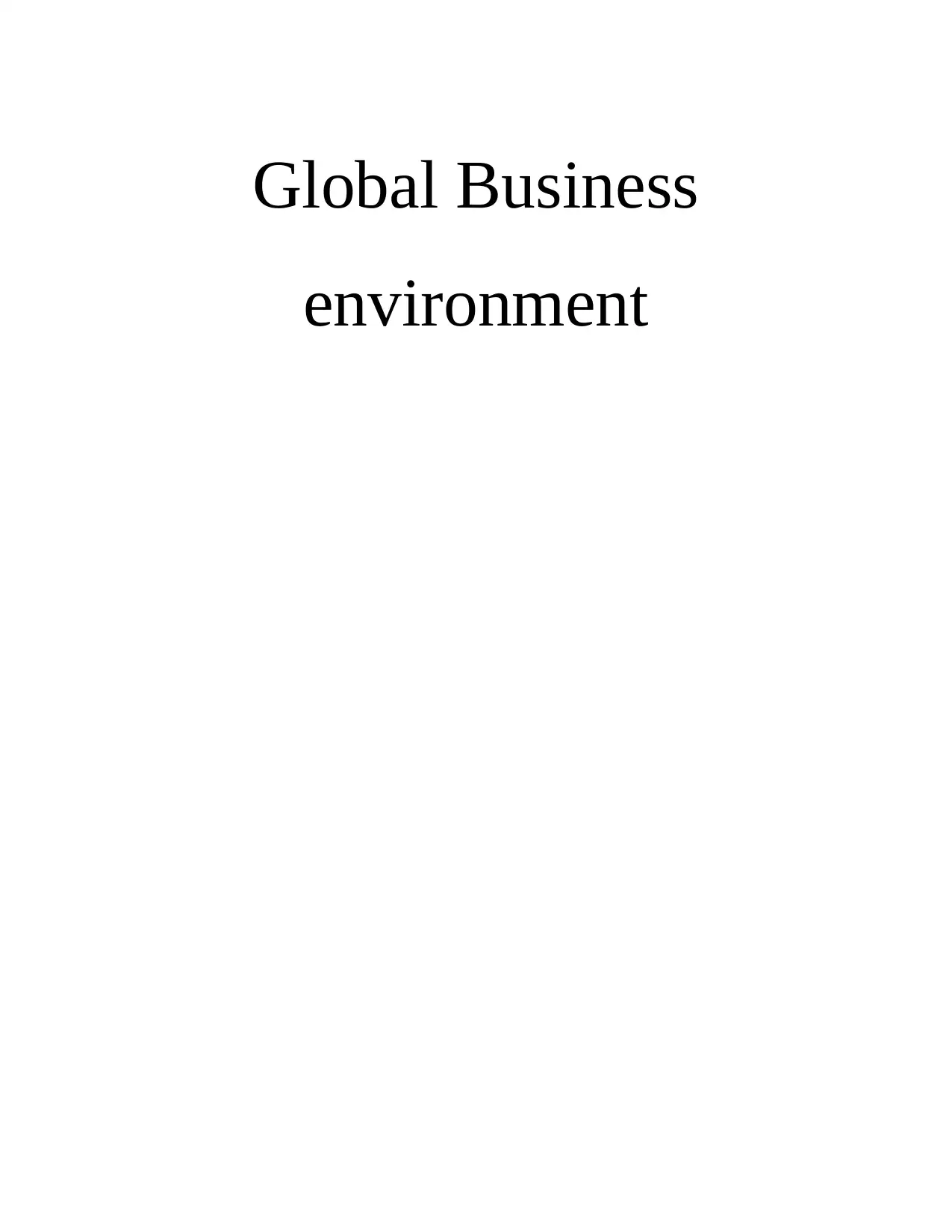
Global Business
environment
environment
Paraphrase This Document
Need a fresh take? Get an instant paraphrase of this document with our AI Paraphraser
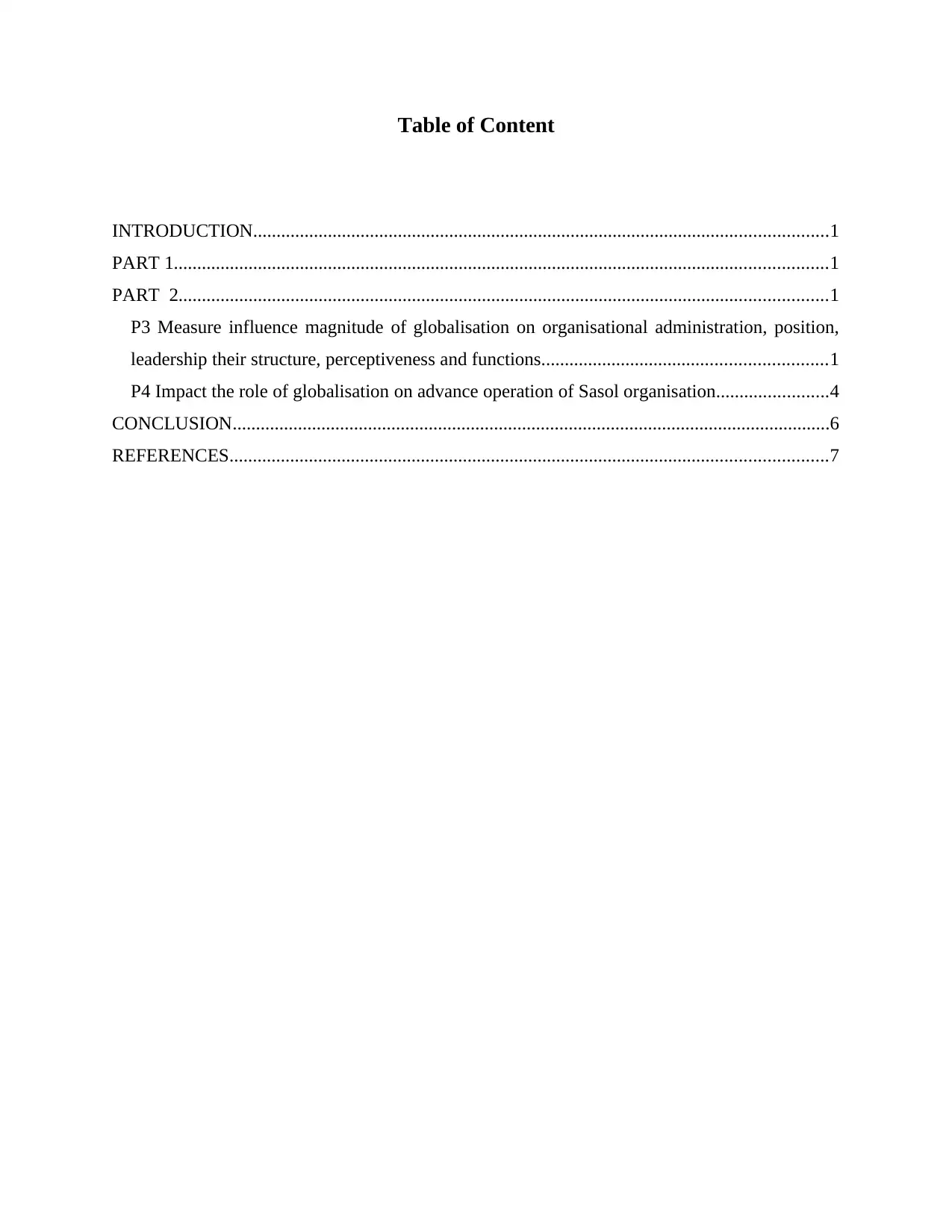
Table of Content
INTRODUCTION...........................................................................................................................1
PART 1............................................................................................................................................1
PART 2...........................................................................................................................................1
P3 Measure influence magnitude of globalisation on organisational administration, position,
leadership their structure, perceptiveness and functions.............................................................1
P4 Impact the role of globalisation on advance operation of Sasol organisation........................4
CONCLUSION................................................................................................................................6
REFERENCES................................................................................................................................7
INTRODUCTION...........................................................................................................................1
PART 1............................................................................................................................................1
PART 2...........................................................................................................................................1
P3 Measure influence magnitude of globalisation on organisational administration, position,
leadership their structure, perceptiveness and functions.............................................................1
P4 Impact the role of globalisation on advance operation of Sasol organisation........................4
CONCLUSION................................................................................................................................6
REFERENCES................................................................................................................................7
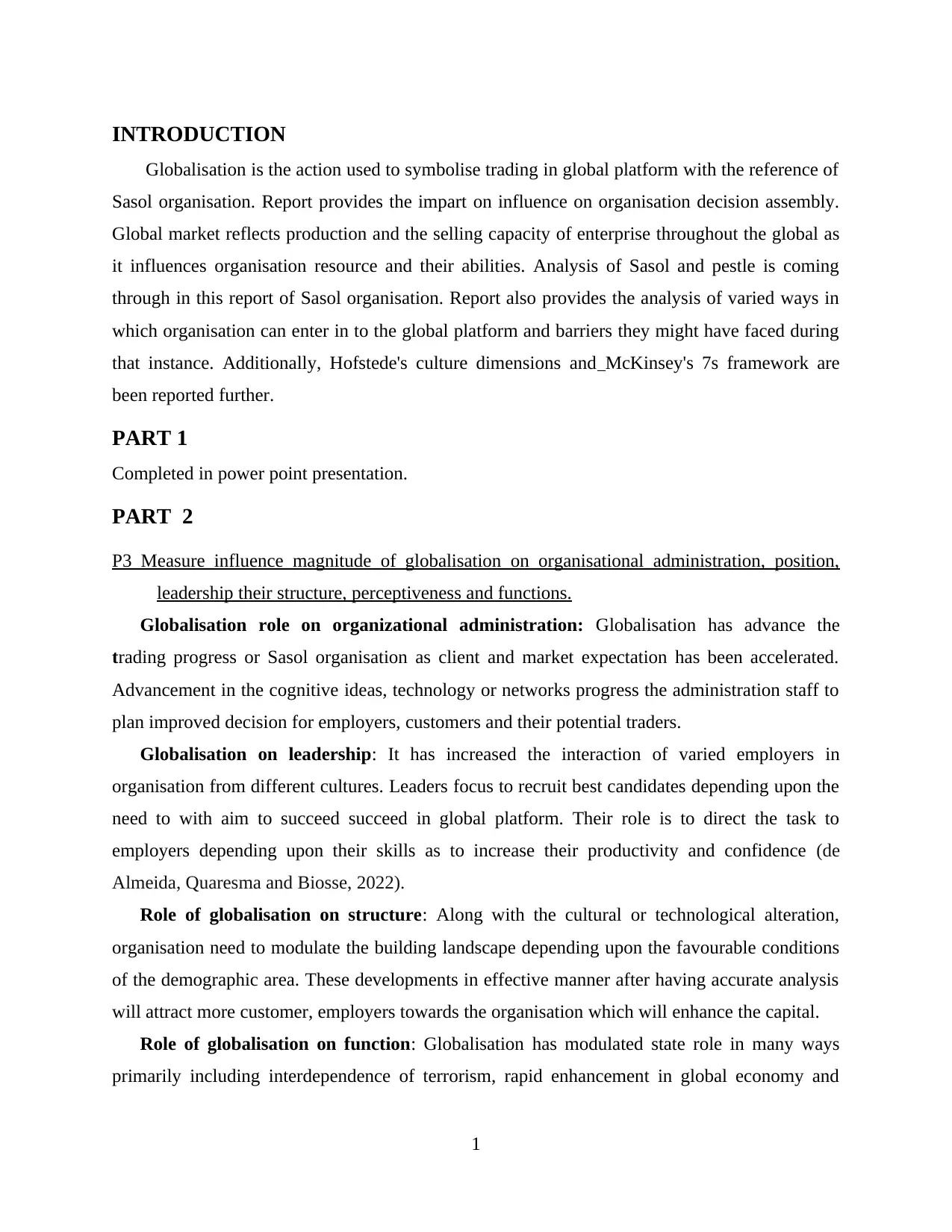
INTRODUCTION
Globalisation is the action used to symbolise trading in global platform with the reference of
Sasol organisation. Report provides the impart on influence on organisation decision assembly.
Global market reflects production and the selling capacity of enterprise throughout the global as
it influences organisation resource and their abilities. Analysis of Sasol and pestle is coming
through in this report of Sasol organisation. Report also provides the analysis of varied ways in
which organisation can enter in to the global platform and barriers they might have faced during
that instance. Additionally, Hofstede's culture dimensions and McKinsey's 7s framework are
been reported further.
PART 1
Completed in power point presentation.
PART 2
P3 Measure influence magnitude of globalisation on organisational administration, position,
leadership their structure, perceptiveness and functions.
Globalisation role on organizational administration: Globalisation has advance the
trading progress or Sasol organisation as client and market expectation has been accelerated.
Advancement in the cognitive ideas, technology or networks progress the administration staff to
plan improved decision for employers, customers and their potential traders.
Globalisation on leadership: It has increased the interaction of varied employers in
organisation from different cultures. Leaders focus to recruit best candidates depending upon the
need to with aim to succeed succeed in global platform. Their role is to direct the task to
employers depending upon their skills as to increase their productivity and confidence (de
Almeida, Quaresma and Biosse, 2022).
Role of globalisation on structure: Along with the cultural or technological alteration,
organisation need to modulate the building landscape depending upon the favourable conditions
of the demographic area. These developments in effective manner after having accurate analysis
will attract more customer, employers towards the organisation which will enhance the capital.
Role of globalisation on function: Globalisation has modulated state role in many ways
primarily including interdependence of terrorism, rapid enhancement in global economy and
1
Globalisation is the action used to symbolise trading in global platform with the reference of
Sasol organisation. Report provides the impart on influence on organisation decision assembly.
Global market reflects production and the selling capacity of enterprise throughout the global as
it influences organisation resource and their abilities. Analysis of Sasol and pestle is coming
through in this report of Sasol organisation. Report also provides the analysis of varied ways in
which organisation can enter in to the global platform and barriers they might have faced during
that instance. Additionally, Hofstede's culture dimensions and McKinsey's 7s framework are
been reported further.
PART 1
Completed in power point presentation.
PART 2
P3 Measure influence magnitude of globalisation on organisational administration, position,
leadership their structure, perceptiveness and functions.
Globalisation role on organizational administration: Globalisation has advance the
trading progress or Sasol organisation as client and market expectation has been accelerated.
Advancement in the cognitive ideas, technology or networks progress the administration staff to
plan improved decision for employers, customers and their potential traders.
Globalisation on leadership: It has increased the interaction of varied employers in
organisation from different cultures. Leaders focus to recruit best candidates depending upon the
need to with aim to succeed succeed in global platform. Their role is to direct the task to
employers depending upon their skills as to increase their productivity and confidence (de
Almeida, Quaresma and Biosse, 2022).
Role of globalisation on structure: Along with the cultural or technological alteration,
organisation need to modulate the building landscape depending upon the favourable conditions
of the demographic area. These developments in effective manner after having accurate analysis
will attract more customer, employers towards the organisation which will enhance the capital.
Role of globalisation on function: Globalisation has modulated state role in many ways
primarily including interdependence of terrorism, rapid enhancement in global economy and
1
⊘ This is a preview!⊘
Do you want full access?
Subscribe today to unlock all pages.

Trusted by 1+ million students worldwide
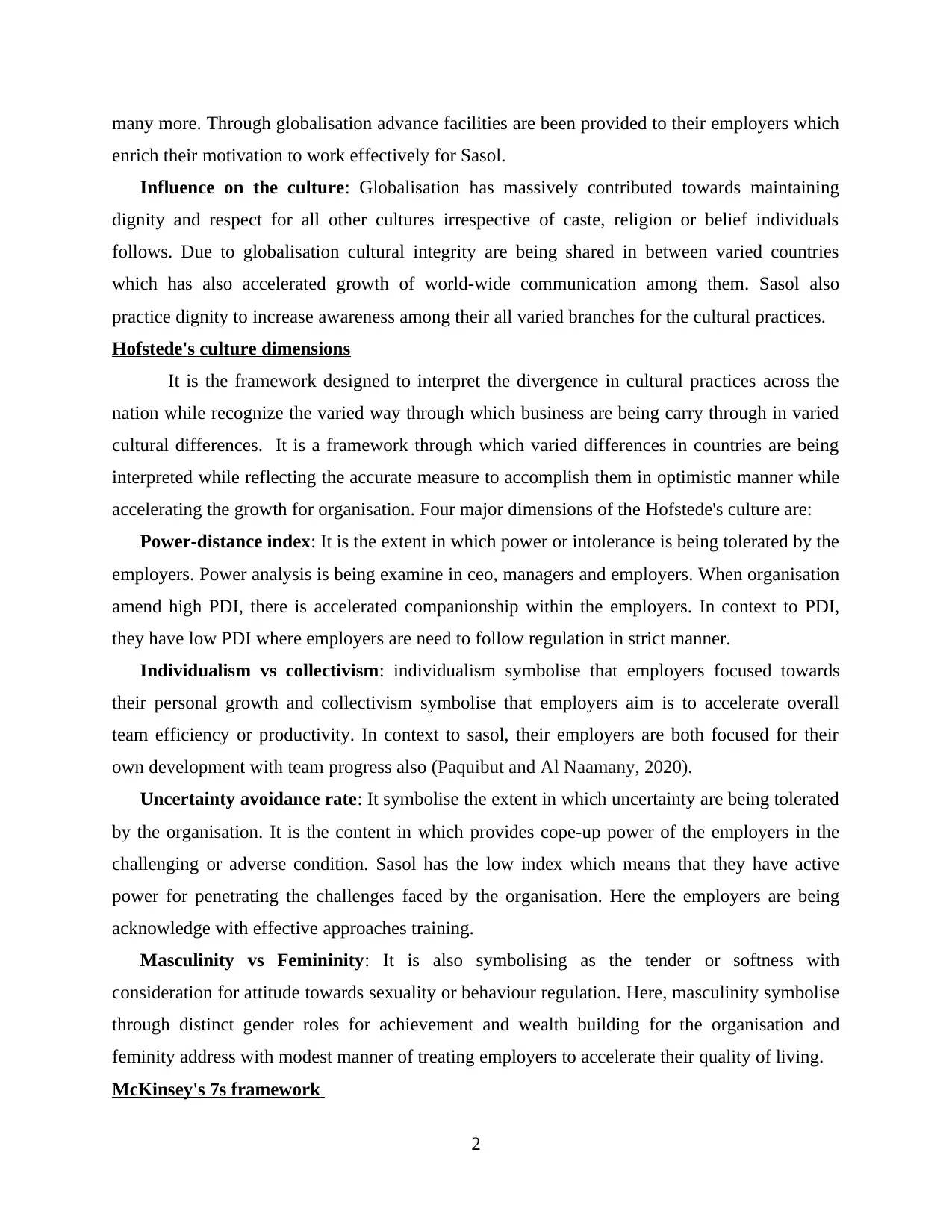
many more. Through globalisation advance facilities are been provided to their employers which
enrich their motivation to work effectively for Sasol.
Influence on the culture: Globalisation has massively contributed towards maintaining
dignity and respect for all other cultures irrespective of caste, religion or belief individuals
follows. Due to globalisation cultural integrity are being shared in between varied countries
which has also accelerated growth of world-wide communication among them. Sasol also
practice dignity to increase awareness among their all varied branches for the cultural practices.
Hofstede's culture dimensions
It is the framework designed to interpret the divergence in cultural practices across the
nation while recognize the varied way through which business are being carry through in varied
cultural differences. It is a framework through which varied differences in countries are being
interpreted while reflecting the accurate measure to accomplish them in optimistic manner while
accelerating the growth for organisation. Four major dimensions of the Hofstede's culture are:
Power-distance index: It is the extent in which power or intolerance is being tolerated by the
employers. Power analysis is being examine in ceo, managers and employers. When organisation
amend high PDI, there is accelerated companionship within the employers. In context to PDI,
they have low PDI where employers are need to follow regulation in strict manner.
Individualism vs collectivism: individualism symbolise that employers focused towards
their personal growth and collectivism symbolise that employers aim is to accelerate overall
team efficiency or productivity. In context to sasol, their employers are both focused for their
own development with team progress also (Paquibut and Al Naamany, 2020).
Uncertainty avoidance rate: It symbolise the extent in which uncertainty are being tolerated
by the organisation. It is the content in which provides cope-up power of the employers in the
challenging or adverse condition. Sasol has the low index which means that they have active
power for penetrating the challenges faced by the organisation. Here the employers are being
acknowledge with effective approaches training.
Masculinity vs Femininity: It is also symbolising as the tender or softness with
consideration for attitude towards sexuality or behaviour regulation. Here, masculinity symbolise
through distinct gender roles for achievement and wealth building for the organisation and
feminity address with modest manner of treating employers to accelerate their quality of living.
McKinsey's 7s framework
2
enrich their motivation to work effectively for Sasol.
Influence on the culture: Globalisation has massively contributed towards maintaining
dignity and respect for all other cultures irrespective of caste, religion or belief individuals
follows. Due to globalisation cultural integrity are being shared in between varied countries
which has also accelerated growth of world-wide communication among them. Sasol also
practice dignity to increase awareness among their all varied branches for the cultural practices.
Hofstede's culture dimensions
It is the framework designed to interpret the divergence in cultural practices across the
nation while recognize the varied way through which business are being carry through in varied
cultural differences. It is a framework through which varied differences in countries are being
interpreted while reflecting the accurate measure to accomplish them in optimistic manner while
accelerating the growth for organisation. Four major dimensions of the Hofstede's culture are:
Power-distance index: It is the extent in which power or intolerance is being tolerated by the
employers. Power analysis is being examine in ceo, managers and employers. When organisation
amend high PDI, there is accelerated companionship within the employers. In context to PDI,
they have low PDI where employers are need to follow regulation in strict manner.
Individualism vs collectivism: individualism symbolise that employers focused towards
their personal growth and collectivism symbolise that employers aim is to accelerate overall
team efficiency or productivity. In context to sasol, their employers are both focused for their
own development with team progress also (Paquibut and Al Naamany, 2020).
Uncertainty avoidance rate: It symbolise the extent in which uncertainty are being tolerated
by the organisation. It is the content in which provides cope-up power of the employers in the
challenging or adverse condition. Sasol has the low index which means that they have active
power for penetrating the challenges faced by the organisation. Here the employers are being
acknowledge with effective approaches training.
Masculinity vs Femininity: It is also symbolising as the tender or softness with
consideration for attitude towards sexuality or behaviour regulation. Here, masculinity symbolise
through distinct gender roles for achievement and wealth building for the organisation and
feminity address with modest manner of treating employers to accelerate their quality of living.
McKinsey's 7s framework
2
Paraphrase This Document
Need a fresh take? Get an instant paraphrase of this document with our AI Paraphraser
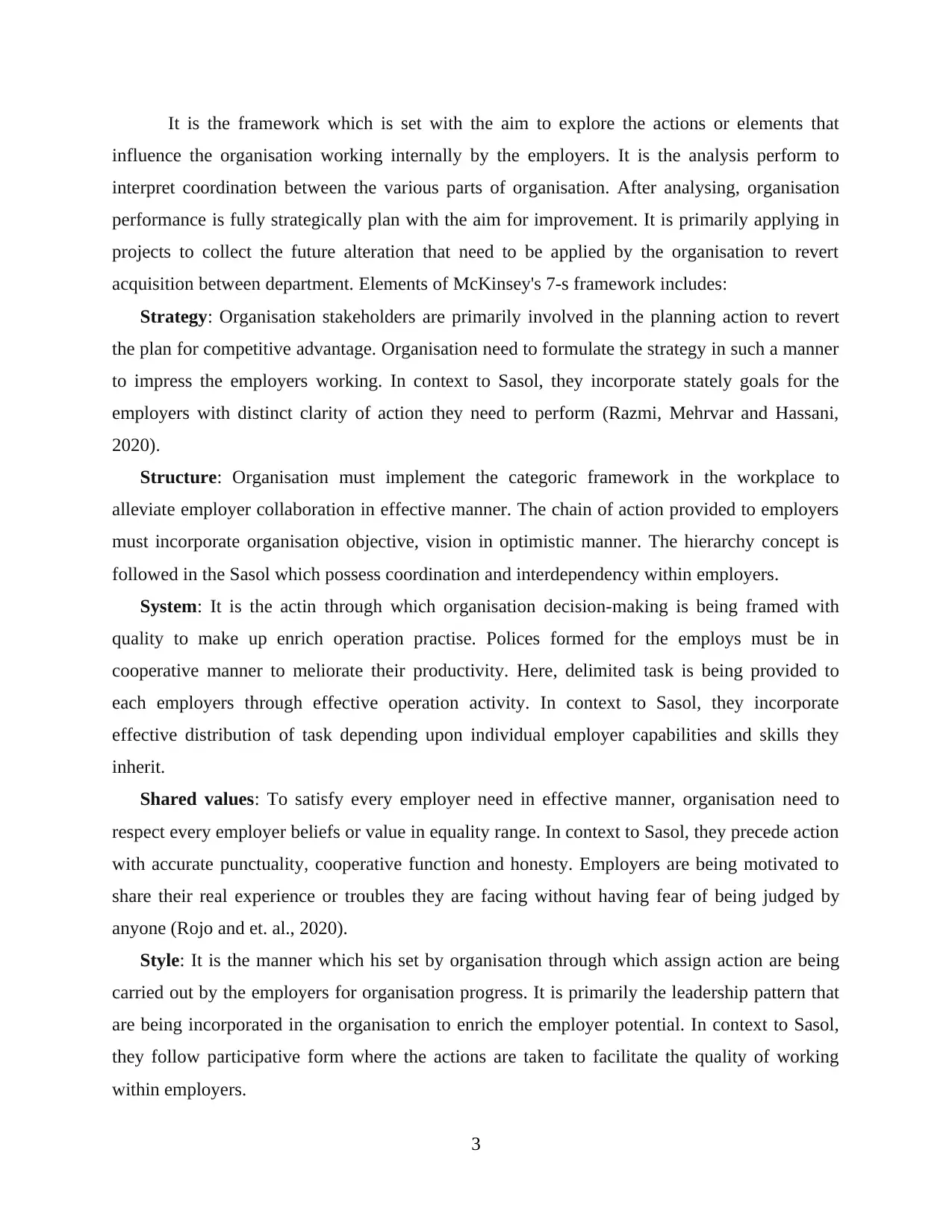
It is the framework which is set with the aim to explore the actions or elements that
influence the organisation working internally by the employers. It is the analysis perform to
interpret coordination between the various parts of organisation. After analysing, organisation
performance is fully strategically plan with the aim for improvement. It is primarily applying in
projects to collect the future alteration that need to be applied by the organisation to revert
acquisition between department. Elements of McKinsey's 7-s framework includes:
Strategy: Organisation stakeholders are primarily involved in the planning action to revert
the plan for competitive advantage. Organisation need to formulate the strategy in such a manner
to impress the employers working. In context to Sasol, they incorporate stately goals for the
employers with distinct clarity of action they need to perform (Razmi, Mehrvar and Hassani,
2020).
Structure: Organisation must implement the categoric framework in the workplace to
alleviate employer collaboration in effective manner. The chain of action provided to employers
must incorporate organisation objective, vision in optimistic manner. The hierarchy concept is
followed in the Sasol which possess coordination and interdependency within employers.
System: It is the actin through which organisation decision-making is being framed with
quality to make up enrich operation practise. Polices formed for the employs must be in
cooperative manner to meliorate their productivity. Here, delimited task is being provided to
each employers through effective operation activity. In context to Sasol, they incorporate
effective distribution of task depending upon individual employer capabilities and skills they
inherit.
Shared values: To satisfy every employer need in effective manner, organisation need to
respect every employer beliefs or value in equality range. In context to Sasol, they precede action
with accurate punctuality, cooperative function and honesty. Employers are being motivated to
share their real experience or troubles they are facing without having fear of being judged by
anyone (Rojo and et. al., 2020).
Style: It is the manner which his set by organisation through which assign action are being
carried out by the employers for organisation progress. It is primarily the leadership pattern that
are being incorporated in the organisation to enrich the employer potential. In context to Sasol,
they follow participative form where the actions are taken to facilitate the quality of working
within employers.
3
influence the organisation working internally by the employers. It is the analysis perform to
interpret coordination between the various parts of organisation. After analysing, organisation
performance is fully strategically plan with the aim for improvement. It is primarily applying in
projects to collect the future alteration that need to be applied by the organisation to revert
acquisition between department. Elements of McKinsey's 7-s framework includes:
Strategy: Organisation stakeholders are primarily involved in the planning action to revert
the plan for competitive advantage. Organisation need to formulate the strategy in such a manner
to impress the employers working. In context to Sasol, they incorporate stately goals for the
employers with distinct clarity of action they need to perform (Razmi, Mehrvar and Hassani,
2020).
Structure: Organisation must implement the categoric framework in the workplace to
alleviate employer collaboration in effective manner. The chain of action provided to employers
must incorporate organisation objective, vision in optimistic manner. The hierarchy concept is
followed in the Sasol which possess coordination and interdependency within employers.
System: It is the actin through which organisation decision-making is being framed with
quality to make up enrich operation practise. Polices formed for the employs must be in
cooperative manner to meliorate their productivity. Here, delimited task is being provided to
each employers through effective operation activity. In context to Sasol, they incorporate
effective distribution of task depending upon individual employer capabilities and skills they
inherit.
Shared values: To satisfy every employer need in effective manner, organisation need to
respect every employer beliefs or value in equality range. In context to Sasol, they precede action
with accurate punctuality, cooperative function and honesty. Employers are being motivated to
share their real experience or troubles they are facing without having fear of being judged by
anyone (Rojo and et. al., 2020).
Style: It is the manner which his set by organisation through which assign action are being
carried out by the employers for organisation progress. It is primarily the leadership pattern that
are being incorporated in the organisation to enrich the employer potential. In context to Sasol,
they follow participative form where the actions are taken to facilitate the quality of working
within employers.
3
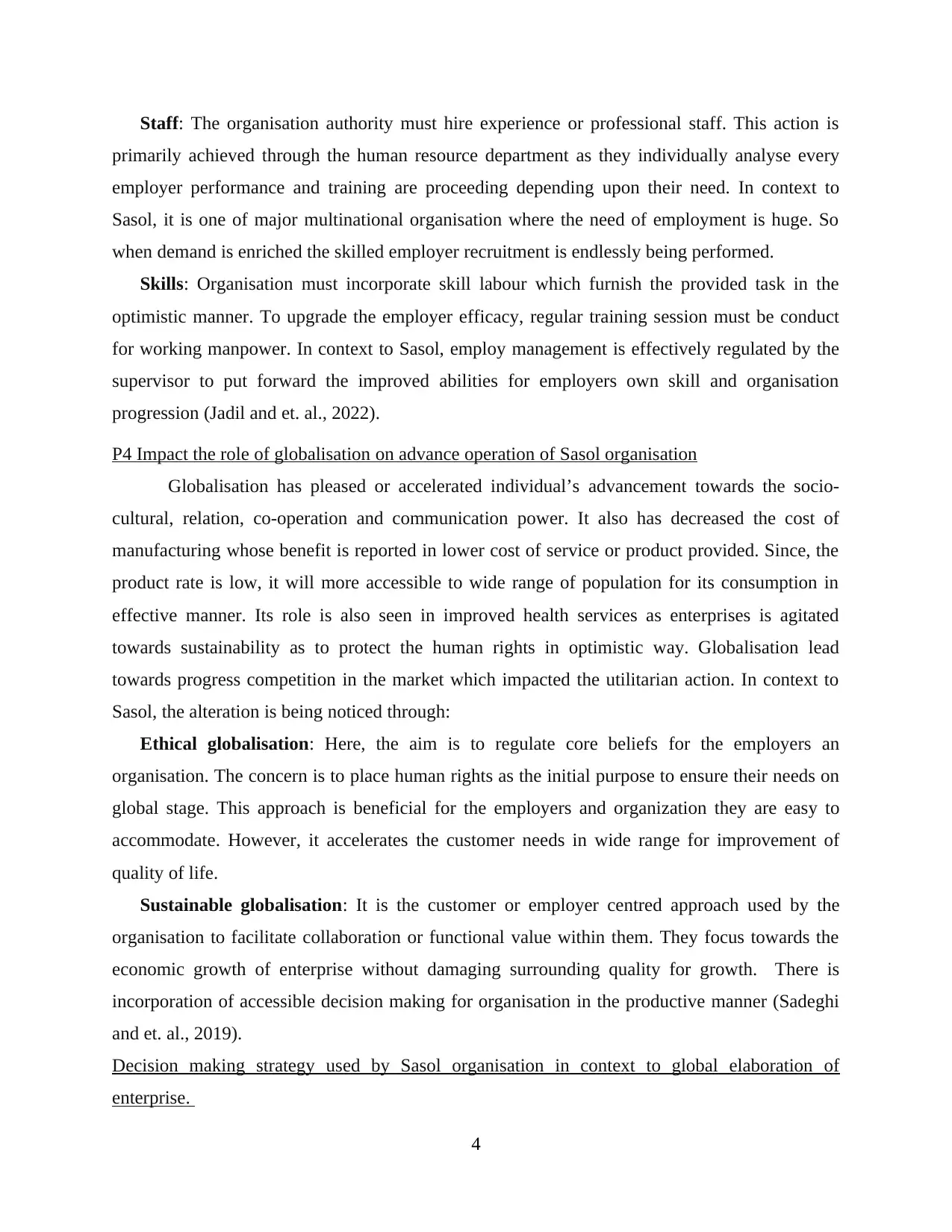
Staff: The organisation authority must hire experience or professional staff. This action is
primarily achieved through the human resource department as they individually analyse every
employer performance and training are proceeding depending upon their need. In context to
Sasol, it is one of major multinational organisation where the need of employment is huge. So
when demand is enriched the skilled employer recruitment is endlessly being performed.
Skills: Organisation must incorporate skill labour which furnish the provided task in the
optimistic manner. To upgrade the employer efficacy, regular training session must be conduct
for working manpower. In context to Sasol, employ management is effectively regulated by the
supervisor to put forward the improved abilities for employers own skill and organisation
progression (Jadil and et. al., 2022).
P4 Impact the role of globalisation on advance operation of Sasol organisation
Globalisation has pleased or accelerated individual’s advancement towards the socio-
cultural, relation, co-operation and communication power. It also has decreased the cost of
manufacturing whose benefit is reported in lower cost of service or product provided. Since, the
product rate is low, it will more accessible to wide range of population for its consumption in
effective manner. Its role is also seen in improved health services as enterprises is agitated
towards sustainability as to protect the human rights in optimistic way. Globalisation lead
towards progress competition in the market which impacted the utilitarian action. In context to
Sasol, the alteration is being noticed through:
Ethical globalisation: Here, the aim is to regulate core beliefs for the employers an
organisation. The concern is to place human rights as the initial purpose to ensure their needs on
global stage. This approach is beneficial for the employers and organization they are easy to
accommodate. However, it accelerates the customer needs in wide range for improvement of
quality of life.
Sustainable globalisation: It is the customer or employer centred approach used by the
organisation to facilitate collaboration or functional value within them. They focus towards the
economic growth of enterprise without damaging surrounding quality for growth. There is
incorporation of accessible decision making for organisation in the productive manner (Sadeghi
and et. al., 2019).
Decision making strategy used by Sasol organisation in context to global elaboration of
enterprise.
4
primarily achieved through the human resource department as they individually analyse every
employer performance and training are proceeding depending upon their need. In context to
Sasol, it is one of major multinational organisation where the need of employment is huge. So
when demand is enriched the skilled employer recruitment is endlessly being performed.
Skills: Organisation must incorporate skill labour which furnish the provided task in the
optimistic manner. To upgrade the employer efficacy, regular training session must be conduct
for working manpower. In context to Sasol, employ management is effectively regulated by the
supervisor to put forward the improved abilities for employers own skill and organisation
progression (Jadil and et. al., 2022).
P4 Impact the role of globalisation on advance operation of Sasol organisation
Globalisation has pleased or accelerated individual’s advancement towards the socio-
cultural, relation, co-operation and communication power. It also has decreased the cost of
manufacturing whose benefit is reported in lower cost of service or product provided. Since, the
product rate is low, it will more accessible to wide range of population for its consumption in
effective manner. Its role is also seen in improved health services as enterprises is agitated
towards sustainability as to protect the human rights in optimistic way. Globalisation lead
towards progress competition in the market which impacted the utilitarian action. In context to
Sasol, the alteration is being noticed through:
Ethical globalisation: Here, the aim is to regulate core beliefs for the employers an
organisation. The concern is to place human rights as the initial purpose to ensure their needs on
global stage. This approach is beneficial for the employers and organization they are easy to
accommodate. However, it accelerates the customer needs in wide range for improvement of
quality of life.
Sustainable globalisation: It is the customer or employer centred approach used by the
organisation to facilitate collaboration or functional value within them. They focus towards the
economic growth of enterprise without damaging surrounding quality for growth. There is
incorporation of accessible decision making for organisation in the productive manner (Sadeghi
and et. al., 2019).
Decision making strategy used by Sasol organisation in context to global elaboration of
enterprise.
4
⊘ This is a preview!⊘
Do you want full access?
Subscribe today to unlock all pages.

Trusted by 1+ million students worldwide
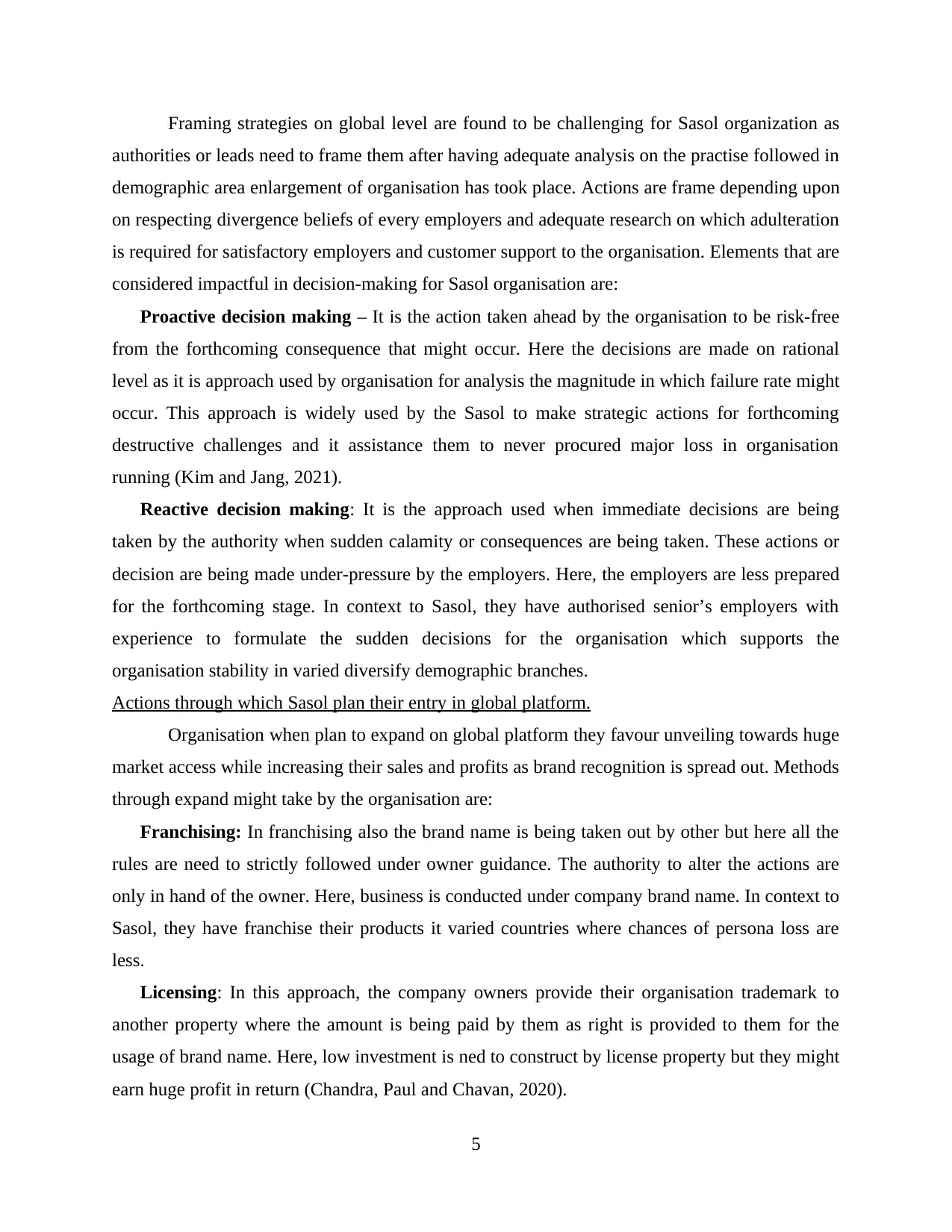
Framing strategies on global level are found to be challenging for Sasol organization as
authorities or leads need to frame them after having adequate analysis on the practise followed in
demographic area enlargement of organisation has took place. Actions are frame depending upon
on respecting divergence beliefs of every employers and adequate research on which adulteration
is required for satisfactory employers and customer support to the organisation. Elements that are
considered impactful in decision-making for Sasol organisation are:
Proactive decision making – It is the action taken ahead by the organisation to be risk-free
from the forthcoming consequence that might occur. Here the decisions are made on rational
level as it is approach used by organisation for analysis the magnitude in which failure rate might
occur. This approach is widely used by the Sasol to make strategic actions for forthcoming
destructive challenges and it assistance them to never procured major loss in organisation
running (Kim and Jang, 2021).
Reactive decision making: It is the approach used when immediate decisions are being
taken by the authority when sudden calamity or consequences are being taken. These actions or
decision are being made under-pressure by the employers. Here, the employers are less prepared
for the forthcoming stage. In context to Sasol, they have authorised senior’s employers with
experience to formulate the sudden decisions for the organisation which supports the
organisation stability in varied diversify demographic branches.
Actions through which Sasol plan their entry in global platform.
Organisation when plan to expand on global platform they favour unveiling towards huge
market access while increasing their sales and profits as brand recognition is spread out. Methods
through expand might take by the organisation are:
Franchising: In franchising also the brand name is being taken out by other but here all the
rules are need to strictly followed under owner guidance. The authority to alter the actions are
only in hand of the owner. Here, business is conducted under company brand name. In context to
Sasol, they have franchise their products it varied countries where chances of persona loss are
less.
Licensing: In this approach, the company owners provide their organisation trademark to
another property where the amount is being paid by them as right is provided to them for the
usage of brand name. Here, low investment is ned to construct by license property but they might
earn huge profit in return (Chandra, Paul and Chavan, 2020).
5
authorities or leads need to frame them after having adequate analysis on the practise followed in
demographic area enlargement of organisation has took place. Actions are frame depending upon
on respecting divergence beliefs of every employers and adequate research on which adulteration
is required for satisfactory employers and customer support to the organisation. Elements that are
considered impactful in decision-making for Sasol organisation are:
Proactive decision making – It is the action taken ahead by the organisation to be risk-free
from the forthcoming consequence that might occur. Here the decisions are made on rational
level as it is approach used by organisation for analysis the magnitude in which failure rate might
occur. This approach is widely used by the Sasol to make strategic actions for forthcoming
destructive challenges and it assistance them to never procured major loss in organisation
running (Kim and Jang, 2021).
Reactive decision making: It is the approach used when immediate decisions are being
taken by the authority when sudden calamity or consequences are being taken. These actions or
decision are being made under-pressure by the employers. Here, the employers are less prepared
for the forthcoming stage. In context to Sasol, they have authorised senior’s employers with
experience to formulate the sudden decisions for the organisation which supports the
organisation stability in varied diversify demographic branches.
Actions through which Sasol plan their entry in global platform.
Organisation when plan to expand on global platform they favour unveiling towards huge
market access while increasing their sales and profits as brand recognition is spread out. Methods
through expand might take by the organisation are:
Franchising: In franchising also the brand name is being taken out by other but here all the
rules are need to strictly followed under owner guidance. The authority to alter the actions are
only in hand of the owner. Here, business is conducted under company brand name. In context to
Sasol, they have franchise their products it varied countries where chances of persona loss are
less.
Licensing: In this approach, the company owners provide their organisation trademark to
another property where the amount is being paid by them as right is provided to them for the
usage of brand name. Here, low investment is ned to construct by license property but they might
earn huge profit in return (Chandra, Paul and Chavan, 2020).
5
Paraphrase This Document
Need a fresh take? Get an instant paraphrase of this document with our AI Paraphraser
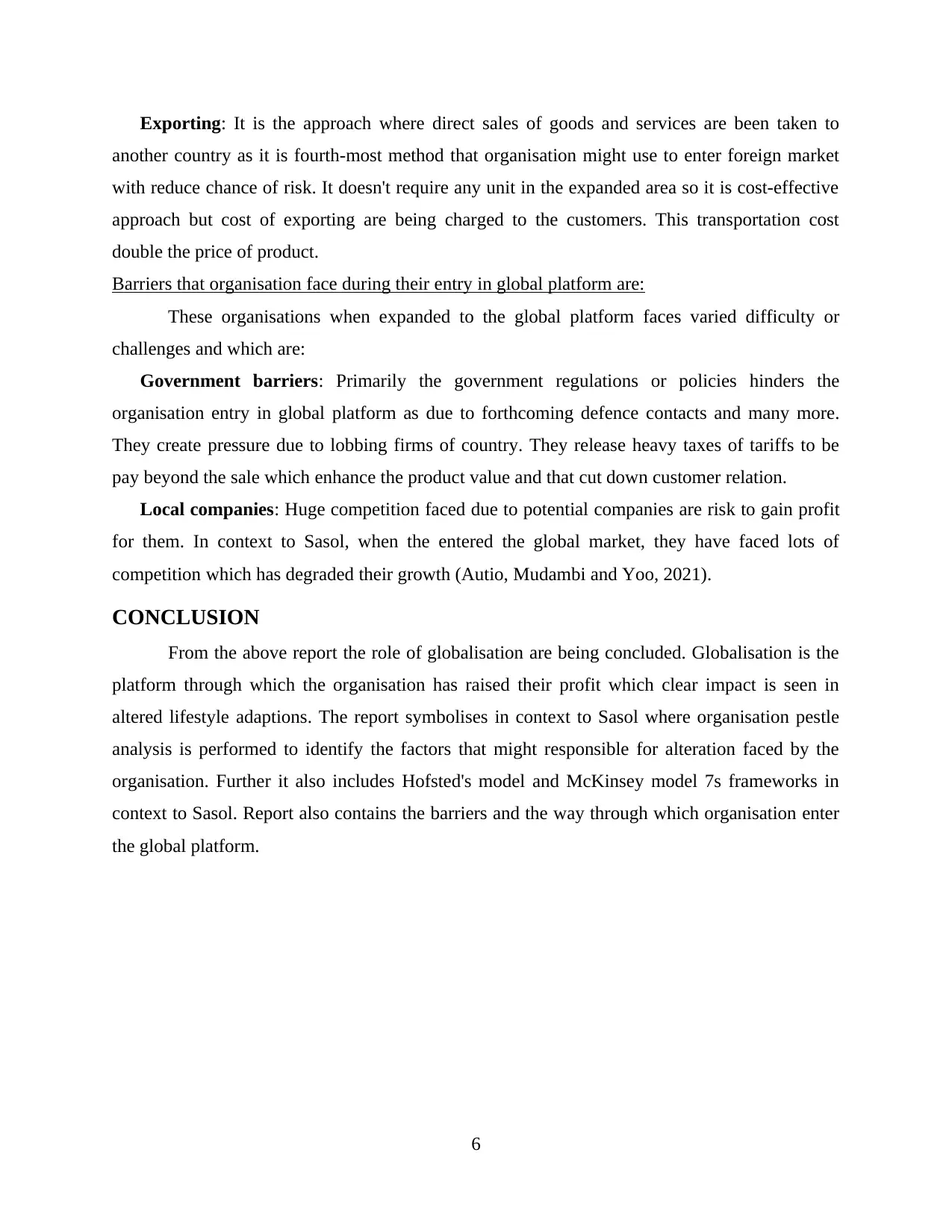
Exporting: It is the approach where direct sales of goods and services are been taken to
another country as it is fourth-most method that organisation might use to enter foreign market
with reduce chance of risk. It doesn't require any unit in the expanded area so it is cost-effective
approach but cost of exporting are being charged to the customers. This transportation cost
double the price of product.
Barriers that organisation face during their entry in global platform are:
These organisations when expanded to the global platform faces varied difficulty or
challenges and which are:
Government barriers: Primarily the government regulations or policies hinders the
organisation entry in global platform as due to forthcoming defence contacts and many more.
They create pressure due to lobbing firms of country. They release heavy taxes of tariffs to be
pay beyond the sale which enhance the product value and that cut down customer relation.
Local companies: Huge competition faced due to potential companies are risk to gain profit
for them. In context to Sasol, when the entered the global market, they have faced lots of
competition which has degraded their growth (Autio, Mudambi and Yoo, 2021).
CONCLUSION
From the above report the role of globalisation are being concluded. Globalisation is the
platform through which the organisation has raised their profit which clear impact is seen in
altered lifestyle adaptions. The report symbolises in context to Sasol where organisation pestle
analysis is performed to identify the factors that might responsible for alteration faced by the
organisation. Further it also includes Hofsted's model and McKinsey model 7s frameworks in
context to Sasol. Report also contains the barriers and the way through which organisation enter
the global platform.
6
another country as it is fourth-most method that organisation might use to enter foreign market
with reduce chance of risk. It doesn't require any unit in the expanded area so it is cost-effective
approach but cost of exporting are being charged to the customers. This transportation cost
double the price of product.
Barriers that organisation face during their entry in global platform are:
These organisations when expanded to the global platform faces varied difficulty or
challenges and which are:
Government barriers: Primarily the government regulations or policies hinders the
organisation entry in global platform as due to forthcoming defence contacts and many more.
They create pressure due to lobbing firms of country. They release heavy taxes of tariffs to be
pay beyond the sale which enhance the product value and that cut down customer relation.
Local companies: Huge competition faced due to potential companies are risk to gain profit
for them. In context to Sasol, when the entered the global market, they have faced lots of
competition which has degraded their growth (Autio, Mudambi and Yoo, 2021).
CONCLUSION
From the above report the role of globalisation are being concluded. Globalisation is the
platform through which the organisation has raised their profit which clear impact is seen in
altered lifestyle adaptions. The report symbolises in context to Sasol where organisation pestle
analysis is performed to identify the factors that might responsible for alteration faced by the
organisation. Further it also includes Hofsted's model and McKinsey model 7s frameworks in
context to Sasol. Report also contains the barriers and the way through which organisation enter
the global platform.
6
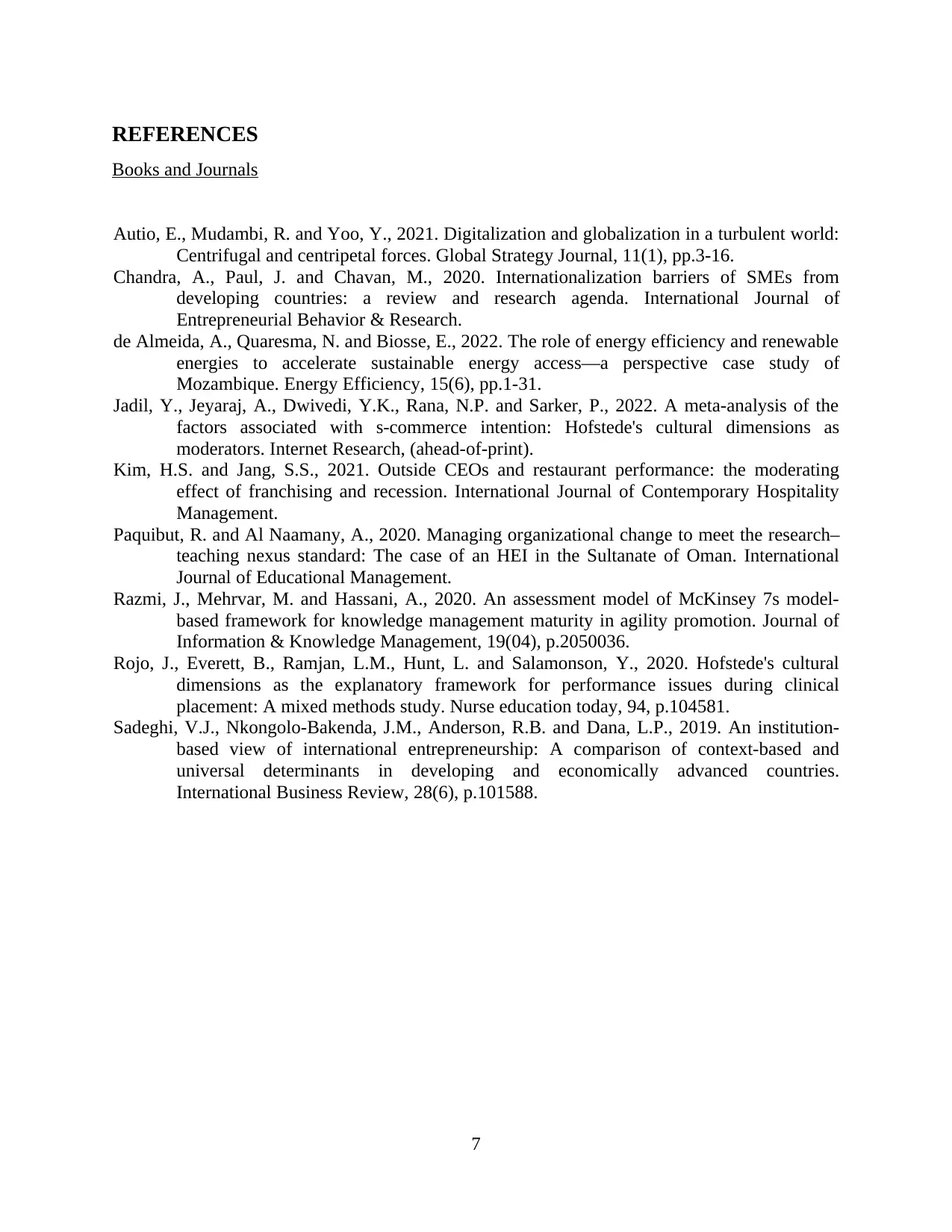
REFERENCES
Books and Journals
Autio, E., Mudambi, R. and Yoo, Y., 2021. Digitalization and globalization in a turbulent world:
Centrifugal and centripetal forces. Global Strategy Journal, 11(1), pp.3-16.
Chandra, A., Paul, J. and Chavan, M., 2020. Internationalization barriers of SMEs from
developing countries: a review and research agenda. International Journal of
Entrepreneurial Behavior & Research.
de Almeida, A., Quaresma, N. and Biosse, E., 2022. The role of energy efficiency and renewable
energies to accelerate sustainable energy access—a perspective case study of
Mozambique. Energy Efficiency, 15(6), pp.1-31.
Jadil, Y., Jeyaraj, A., Dwivedi, Y.K., Rana, N.P. and Sarker, P., 2022. A meta-analysis of the
factors associated with s-commerce intention: Hofstede's cultural dimensions as
moderators. Internet Research, (ahead-of-print).
Kim, H.S. and Jang, S.S., 2021. Outside CEOs and restaurant performance: the moderating
effect of franchising and recession. International Journal of Contemporary Hospitality
Management.
Paquibut, R. and Al Naamany, A., 2020. Managing organizational change to meet the research–
teaching nexus standard: The case of an HEI in the Sultanate of Oman. International
Journal of Educational Management.
Razmi, J., Mehrvar, M. and Hassani, A., 2020. An assessment model of McKinsey 7s model-
based framework for knowledge management maturity in agility promotion. Journal of
Information & Knowledge Management, 19(04), p.2050036.
Rojo, J., Everett, B., Ramjan, L.M., Hunt, L. and Salamonson, Y., 2020. Hofstede's cultural
dimensions as the explanatory framework for performance issues during clinical
placement: A mixed methods study. Nurse education today, 94, p.104581.
Sadeghi, V.J., Nkongolo-Bakenda, J.M., Anderson, R.B. and Dana, L.P., 2019. An institution-
based view of international entrepreneurship: A comparison of context-based and
universal determinants in developing and economically advanced countries.
International Business Review, 28(6), p.101588.
7
Books and Journals
Autio, E., Mudambi, R. and Yoo, Y., 2021. Digitalization and globalization in a turbulent world:
Centrifugal and centripetal forces. Global Strategy Journal, 11(1), pp.3-16.
Chandra, A., Paul, J. and Chavan, M., 2020. Internationalization barriers of SMEs from
developing countries: a review and research agenda. International Journal of
Entrepreneurial Behavior & Research.
de Almeida, A., Quaresma, N. and Biosse, E., 2022. The role of energy efficiency and renewable
energies to accelerate sustainable energy access—a perspective case study of
Mozambique. Energy Efficiency, 15(6), pp.1-31.
Jadil, Y., Jeyaraj, A., Dwivedi, Y.K., Rana, N.P. and Sarker, P., 2022. A meta-analysis of the
factors associated with s-commerce intention: Hofstede's cultural dimensions as
moderators. Internet Research, (ahead-of-print).
Kim, H.S. and Jang, S.S., 2021. Outside CEOs and restaurant performance: the moderating
effect of franchising and recession. International Journal of Contemporary Hospitality
Management.
Paquibut, R. and Al Naamany, A., 2020. Managing organizational change to meet the research–
teaching nexus standard: The case of an HEI in the Sultanate of Oman. International
Journal of Educational Management.
Razmi, J., Mehrvar, M. and Hassani, A., 2020. An assessment model of McKinsey 7s model-
based framework for knowledge management maturity in agility promotion. Journal of
Information & Knowledge Management, 19(04), p.2050036.
Rojo, J., Everett, B., Ramjan, L.M., Hunt, L. and Salamonson, Y., 2020. Hofstede's cultural
dimensions as the explanatory framework for performance issues during clinical
placement: A mixed methods study. Nurse education today, 94, p.104581.
Sadeghi, V.J., Nkongolo-Bakenda, J.M., Anderson, R.B. and Dana, L.P., 2019. An institution-
based view of international entrepreneurship: A comparison of context-based and
universal determinants in developing and economically advanced countries.
International Business Review, 28(6), p.101588.
7
⊘ This is a preview!⊘
Do you want full access?
Subscribe today to unlock all pages.

Trusted by 1+ million students worldwide
1 out of 9
Related Documents
Your All-in-One AI-Powered Toolkit for Academic Success.
+13062052269
info@desklib.com
Available 24*7 on WhatsApp / Email
![[object Object]](/_next/static/media/star-bottom.7253800d.svg)
Unlock your academic potential
Copyright © 2020–2026 A2Z Services. All Rights Reserved. Developed and managed by ZUCOL.

